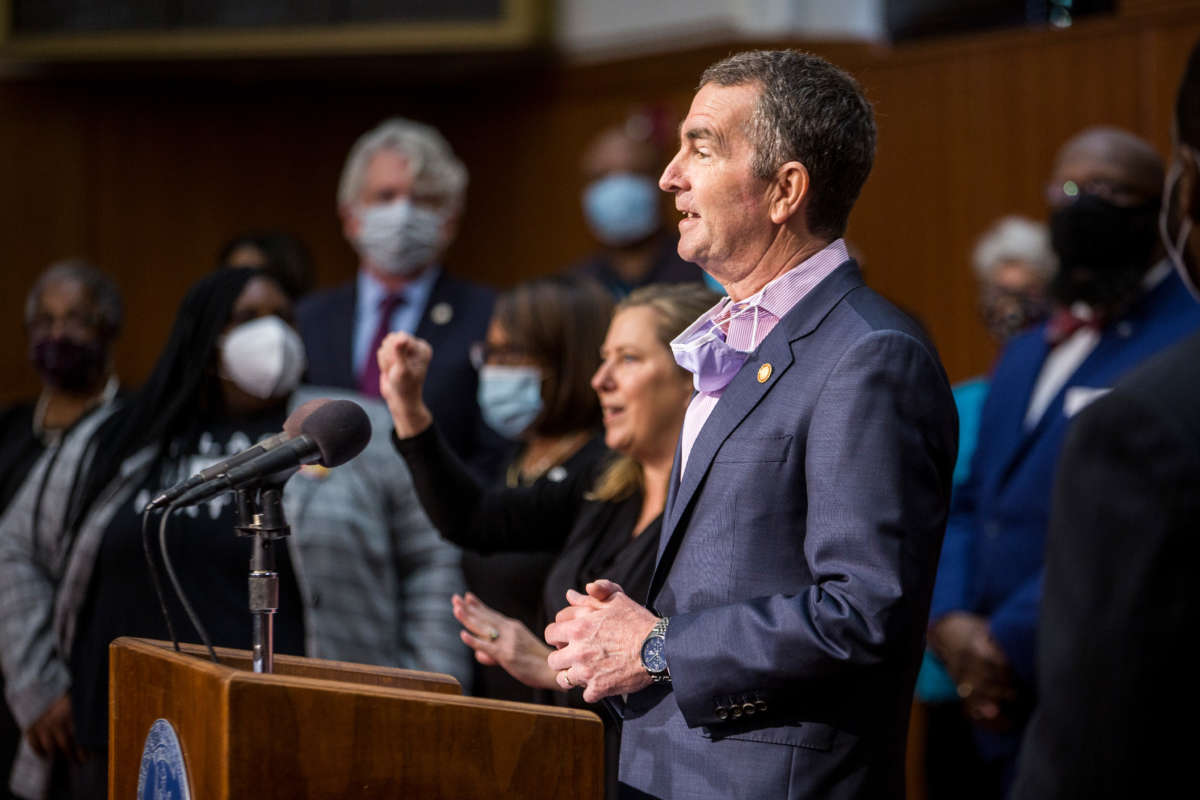Did you know that Truthout is a nonprofit and independently funded by readers like you? If you value what we do, please support our work with a donation.
Democratic Gov. Ralph Northam of Virginia signed into law on Wednesday a bill that officially ends capital punishment in the state, making it the first southern state to abolish the death penalty.
In signing the bill, Northam said it was unacceptable to continue the practice, particularly if it led to the execution of individuals who were found guilty of crimes that they did not commit. He also made note of the fact that the death penalty is historically biased against people of color.
“We can’t give out the ultimate punishment without being 100 percent sure that we’re right,” Northam said. “And we can’t sentence people to that ultimate punishment knowing that the system doesn’t work the same for everyone.”
As a result of the law, two individuals currently imprisoned in the state who are on death row, will have their sentences commuted to life without parole, often regarded by incarcerated persons and their advocates as “death by incarceration.”
During debate on the bill earlier this year, lawmakers in the Virginia state legislature who supported abolishing the death penalty argued that the practice is racially biased, immoral, ineffective at deterring crime and costly to the state.
“I agree, there are horrible people in the world, but what do you say to the last person who was wrongfully executed? What do you say to the family of an innocent man that we put to death?” Democratic Del. Mike Mullin said earlier this week.
Several studies support these arguments. A Harvard study in 2020 found substantial evidence that the death penalty is racist, as persons convicted of killing white people were 17 times more likely to receive a death sentence than persons who were convicted of killing Black people. Other studies have shown that Black defendants are four times more likely to receive a death sentence than their white counterparts who commit similar crimes.
“The death penalty has always been about race,” Claire Gastañaga, executive director of the American Civil Liberties Union of Virginia, said in a statement following the signing of the bill by Northam. “Prior to a Supreme Court ruling in 1978, 90 percent of people who were executed in the Commonwealth were Black. Even today, someone who commits murder is far more likely to get the death penalty if their victim was white, and less likely if the victim was Black. The disparate enforcement of the death penalty is one more way the criminal legal system has devalued Black lives, and ending the death penalty is a victory in the pursuit of racial justice.”
The U.S. is a global outlier when it comes to capital punishment, as more than 70 percent of countries have banned the practice.
Moreover, advocates have emphasized that the death penalty is fundamentally inhumane; it claims to deter violence, but it instead enacts brutal violence itself.
President Joe Biden, despite favoring policies in the past that have expanded its use, campaigned against the death penalty during the 2020 election season, becoming the first candidate ever to win the presidency while expressing that view.
Since assuming office, activists have called on Biden to do more regarding the death penalty, including commuting the sentences of 49 individuals who are currently on federal death row.
“He has the authority to do a lot to limit this punishment and make it much harder for a future administration,” Kristina Roth, with Amnesty International, said last month to CNBC. “We think it’s important during this early period of his administration to remind him what authority he has.”
While abolishing the death penalty is a welcome step toward ending one of the most egregious practices of the prison system, the replacement of capital punishment with life sentences has been criticized as an inhumane, counterproductive alternative.
“These sentences do not enhance ‘public safety,’ but instead eat up resources that would actually prevent violence and incarceration,” Asha Ralph and Brian Pitman wrote for Truthout. “Priorities like housing, health care, education and food assistance address some of the root causes of violence; precious resources should not be funneled toward long prison sentences.”
Press freedom is under attack
As Trump cracks down on political speech, independent media is increasingly necessary.
Truthout produces reporting you won’t see in the mainstream: journalism from the frontlines of global conflict, interviews with grassroots movement leaders, high-quality legal analysis and more.
Our work is possible thanks to reader support. Help Truthout catalyze change and social justice — make a tax-deductible monthly or one-time donation today.
